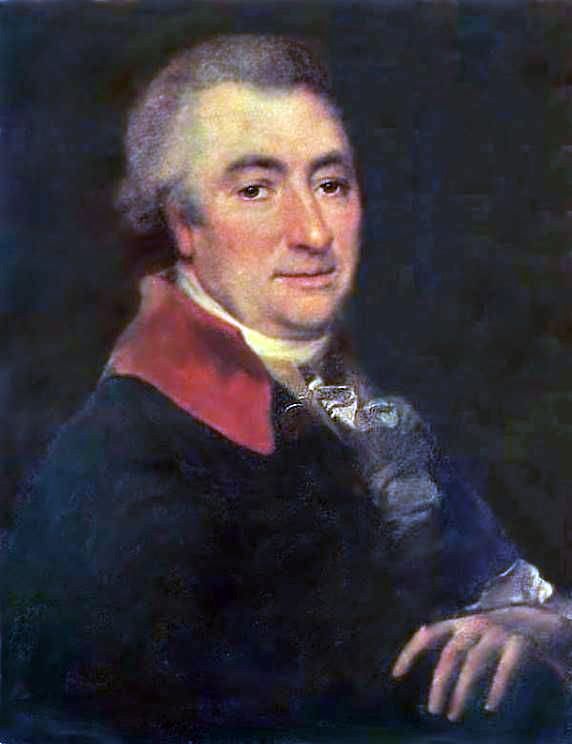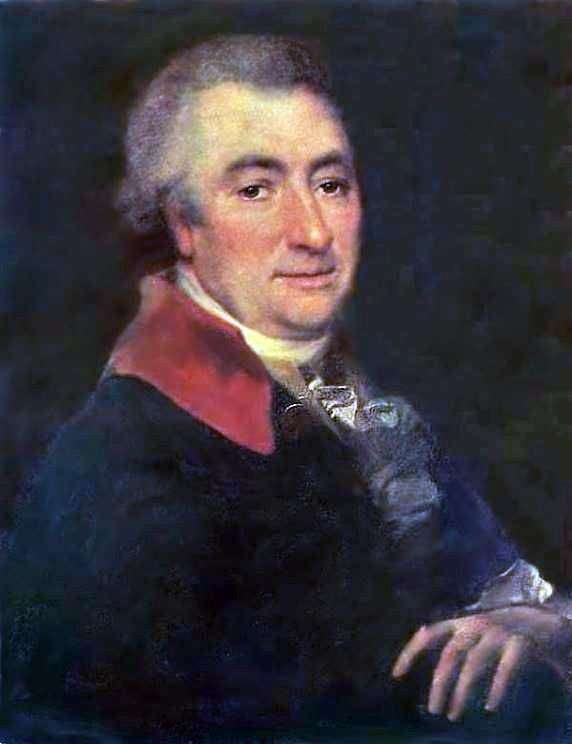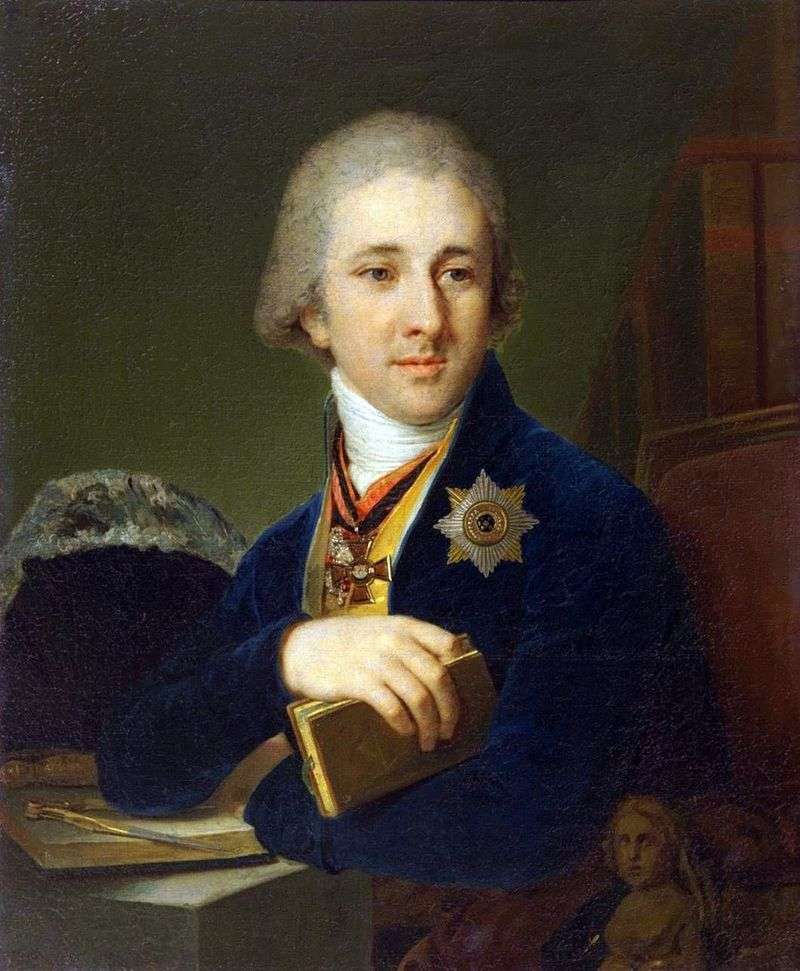
Novikov Nikolai Ivanovich – the famous public figure. He was born on April 26, 1744 in the village of Avdotyin, in the family of a sufficient landowner; studied in Moscow in a university gymnasium, but in 1760 “for laziness and not being in a class” was excluded from the “French class”. At the beginning of 1762 he entered the service in the Izmailovsky regiment and, as a sentry at the Izmailovsky barracks on the day of the accession of Catherine II, was promoted to non-commissioned officer. Already during his service in the regiment, Novikov discovered a “taste for verbal science” and a penchant for books; published two translated French novels and a sonnet.
In 1767, Novikov was among the young people who were entrusted with the protocols in the commission of deputies to compose the draft new code. Participation in the works of the commission acquainted him with many important questions of Russian life and with the conditions of Russian activity and made him personally known to Catherine. In 1768, Novikov retired and soon began to publish a weekly satirical magazine “The Drone”. “The Drone” armed himself against the abuse of landlord power, against injustice and bribery, spoke out against very influential spheres. On the question of the content of the satire “The Drone” entered into a controversy with “All-Anything”, the body of the empress herself. In 1772, Novikov made a new satirical magazine – “The Painter”, the best periodical of the XVIII century “
Freemasons greatly valued Novikov’s entry; contrary to their rules, they informed him of the contents of the first three “degrees” before he entered the box. Novikov was not satisfied with the Yelaginsky system, which he entered, and only later did he find “true” Freemasonry in the Reichel system, in which “everything was turned to morality and self-knowledge.” Already in November 1777, Novikov openly opened a school at the Church of the Vladimir Mother of God, for 30 and 40 people, with boarders and visiting students, paid and donated, later called Catherine’s. The following year, the second school was opened. In 1779, Kheraskov, curator of Moscow University and the Freemason, suggested Novikov to rent a university printing press and the publication of Moscow News. Novikov moved to Moscow.
With his publishing activity, he wanted to create an abundant and accessible supply of useful and entertaining reading for a wide circle of readers. On 448 titles of books published by Novikov, there are 290 books of secular content, as well as a significant number of books of spiritual content, not related to Freemasonry. In order to reduce the cost of books, Novikov entered into relations with all the bookstores that existed at the time; Along with the publishing houses of Novikov, there was also a pedagogical and charitable activity of his circle. In the hungry in 1787, when Novikov on a large scale assisted the starving. Funds brought to this Guards officer Gregory Maksimovich Pohodyashin, the son of the Ural mining company, who gave Novikov all his enormous fortune. Novikov’s activity was in full bloom when a thunderstorm was already gathering over him. The “abusive” story of the Jesuits, which the Empress patronized, printed by Novikov was banned. In 1790, Prince Prozorovsky was appointed commander-in-chief, an ignorant, cruel man. He sent denunciations to Novikov, which caused Count Bezborodko to be on a business trip to Moscow, to produce a secret inquiry. Bezborodko found no reasons for pursuing Novikov. which was protected by the Empress, was banned. In 1790, Prince Prozorovsky was appointed commander-in-chief, an ignorant, cruel man. He sent denunciations to Novikov, which caused Count Bezborodko to be on a business trip to Moscow, to produce a secret inquiry. Bezborodko found no reasons for pursuing Novikov. which was protected by the Empress, was banned. In 1790, Prince Prozorovsky was appointed commander-in-chief, an ignorant, cruel man. He sent denunciations to Novikov, which caused Count Bezborodko to be on a business trip to Moscow, to produce a secret inquiry. Bezborodko found no reasons for pursuing Novikov.
Finding no evidence against Novikov, Prozorovsky requested that the famous investigator of that time, Sheshkovsky, be sent in and presented the inconvenience of transferring the Novikov case to an ordinary court. Even before the end of the investigation, the Empress by decree of May 10, 1792 ordered to secretly transport Novikov to Shlisselburg Fortress, where Sheshkovsky led his new interrogations. On August 1, 1792, the empress signed a decree on the confinement of Novikov to the Shlisselburg fortress for 15 years. Emperor Paul I, on the very first day of his reign, freed Novikov. Novikov was taken to the fortress still in the full development of his strength and energy, and he went out of there “decrepit, old, bent.” He was forced to abandon all social activities and, until his death, he lived almost without a break in Avdotina, taking care of the needs of his peasants and their enlightenment.
 Portrait de N. I. Novikov – Dmitry Levitsky
Portrait de N. I. Novikov – Dmitry Levitsky Retrato de N. I. Novikov – Dmitry Levitsky
Retrato de N. I. Novikov – Dmitry Levitsky Portrait of P. N. Repnina by Dmitry Levitsky
Portrait of P. N. Repnina by Dmitry Levitsky Portrait of Prince A. A. Bezborodko by Johann Baptist Lampi
Portrait of Prince A. A. Bezborodko by Johann Baptist Lampi Portrait of A. D. Lansky by Dmitry Levitsky
Portrait of A. D. Lansky by Dmitry Levitsky Portrait of Countess A. S. Protasova by Dmitry Levitsky
Portrait of Countess A. S. Protasova by Dmitry Levitsky Portrait of the writer, Mason Alexander Fedorovich Labzin in a blue caftan by Vladimir Borovikovsky
Portrait of the writer, Mason Alexander Fedorovich Labzin in a blue caftan by Vladimir Borovikovsky Portrait of A. Ya. Levitskaya by Dmitry Levitsky
Portrait of A. Ya. Levitskaya by Dmitry Levitsky